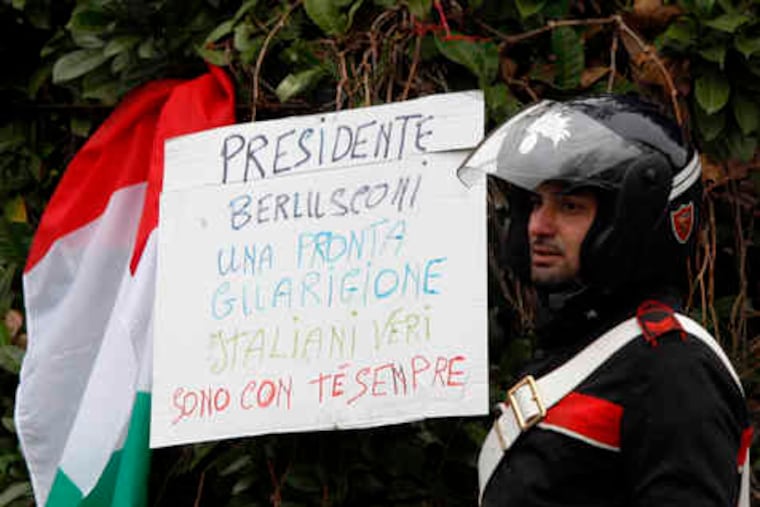Attack on Berlusconi bares Italy's schism
ROME - The weekend assault on Silvio Berlusconi has highlighted how deeply a polarizing figure the Italian prime minister is, as friends and foes dug in even more firmly to their positions on his leadership.

ROME - The weekend assault on Silvio Berlusconi has highlighted how deeply a polarizing figure the Italian prime minister is, as friends and foes dug in even more firmly to their positions on his leadership.
Critics declared yesterday that, while nothing could excuse violence, Berlusconi's clownish antics, scandal-ridden personal life, and attempts to manipulate politics to protect his own interests had alienated a large portion of the population and had even sparked glee in some quarters over the attack.
But the prime minister's associates and allies rallied around him, seeking to parlay the general outpouring of sympathy into a boost for his center-right coalition, which has been struggling to govern amid the travails of its leader.
Berlusconi, 73, remained hospitalized yesterday with a fractured nose and broken teeth. The hospital said he was in good condition but had lost some blood and was in "persistent" pain, the Associated Press reported.
His attacker, who got close enough to hit Berlusconi in the face Sunday with a heavy statuette at a rally in Milan, was identified by police as Massimo Tartaglia, 42. He has a history of mental problems, authorities said.
So far, there has been no report of an overt political motivation behind the assault. Footage of the attack shocked Italians and prompted questions about Berlusconi's security arrangements.
"It's a bad day for Italy," said Gianfrando Fini, a member of Berlusconi's ruling coalition, "and all political parties have a duty to make sure that the country does not relive the years of violence" that plagued Italy in the 1970s.
Others saw it as an unfortunate outgrowth of the sharply divided country that Italy has become under Berlusconi's premiership.
"Berlusconi is among the creators of this climate, and he can't play the victim," Rosy Bindi, an opposition member of parliament, told La Stampa newspaper. "These gestures should always be condemned, never justified. But sometimes they are explicable."
His critics have been enraged and embarrassed by Berlusconi both on the world stage and at home. As an international statesman, he has referred more than once to President Obama as "tanned." In Italy, he is dogged by allegations of throwing parties attended by paid escorts and of trying to pass laws to his own benefit, including one - recently struck down by the court system - that gave him immunity from prosecution. He is embroiled in more than one trial over alleged corruption.
On the other side are staunch defenders who see Berlusconi as a playful but intelligent rogue whose business success is to be admired and whose center-right policies, including opposition to immigration, are exactly what Italy needs.
"The country has really been divided by those who hate Berlusconi, who think he is the source of all the problems of Italy, and those who think he is the source of all the solutions of Italy," political commentator Franco Pavoncello said. "The situation has been so radicalized that the atmosphere, the air you breathe in this country, is not a nice one."
Evidence of that quickly surfaced on the Internet in the hours after Berlusconi was assaulted.
Thousands of users joined Facebook groups that implicitly or explicitly praised the attack. One group declared, "We condemn all forms of violence, but the sight of Berlusconi's battered face is priceless."
But plenty of groups with even more supporters sprang to his defense.
Commentators warned that Italy's polity was in danger of being heavily degraded unless some of the more extreme positions were reined in and replaced by civilized disagreement and debate.
Ezio Mauro wrote in an editorial in La Repubblica, a newspaper that has been a major critic of the prime minister, "Nothing less than freedom itself is at stake."